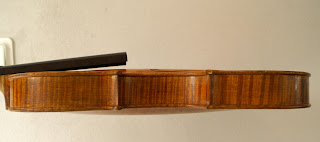Amati, all of which he interpreted freely.
20th-century Italian makers.
on this two piece back.
old masters like Stradivarius, Guarneri and Amati.
and flanks provide a distinctive touch.
In fact it is not even glued onto the neck.
close to the original fingerboard.

The label of this instrument says:
Giuseppe Pedrazzini
Cremonese
fece in Milano l' Anno 19
49 Giuseppe Pedrazzini
(signature on the label
below this text.)
By clicking on this pic you will be able to study
this signature quite secure.

More difficult was the photographing of the branded stamp:
G. Pedrazzini.

The year of manufacturing: 19
49.
He used a variety of different labels and, depending on
the period, one of three different brands. A good part of his
output was exported, and he had particularly close ties
with Hawkes & Son (later Boosey & Hawkes) in London.

Even the for the sides very narrow striped maple has been used.

Probably the sides were mirrored in order to achieve
the ultimate result in beauty. Though during his life he
trained various students in building a good violin it
is very hard to say which instrument he entirely built
himself. Maybe it also explains that every instrument
posesses a certain individuality. This instrument has been
examined by different so called experts and they did not
agree with each other this being original work.
E.M. Penzel
Emil Max Penzel 1887 - 1953 learnt the craft of bow making from
H.R. Pfretzschner who was a celebrated bow maker in Markneukirchen
himself. Even now the family tradition of bow making is still there.
The highest quality has been executed in gold or silver parts.
The entrance bows are supplied with nickel. The weight of this bow
is around 58 / 59 grams which is the weight most bows from his
hand posses. Of course made out of Pernambuco, a very special
wood that is getting even more rare to find nowadays.
The tip of this bow that betrays the octagonal approach
E.M. Penzel was familiar with. Though it is in need of
a rehair job its' condition is good. The specific angles
of the tip is an E.M. Penzel trademark.
What bothered me in the first place was that the branded
name was not accopanied with the two lying music keys.
However recently Matthias Penzel stated that this indeed
could be the case together with the simple Parisian eye on
the frog. Silver winding around the stick as well.
Johann Babtist Schweitzer

This is a 19th century copy of a Johann Babtist Schweitzer
violin. Carefully built and with a nice sound.

Nice, narrow grained (striped) back as can be seen
better by clicking on this picture.

A closer detailed picture of this violin.

The curl of this violin often considered to be an
example of the quality of a particular instrument.
This violin is supposed to be a good copy of the german
celebrated builder Johann Babtist Schweitzer.
A very nice and warm sound produces this one.
S M M Violin (?)
I hope someone will come up with the builder of this 3/4 violin
with a one piece back. Though there are no highly figured woods
used in this violin it appears to be a well built instrument.
By clicking on this picture you are able to see the aging
of this instrument though it is widely known that some
luthiers "aged" their instruments on purpose to make it
look older. 4 finetuners on its' tailpiece though one
must bear in mind that finetuners especially on the lower
strings will influence the sound of the instrument in a
negative way.
As a guitarplayer I do appreciate this one piece back
with its' tasteful figuring and its' outlay.
 Nice woods for neck and back.
Nice woods for neck and back. As often with older instruments: The inevitable cracks.
As often with older instruments: The inevitable cracks. The sides are done with figured maple as is common on better
The sides are done with figured maple as is common on better The curl, a shot most violin lovers like to study.
The curl, a shot most violin lovers like to study. 














































